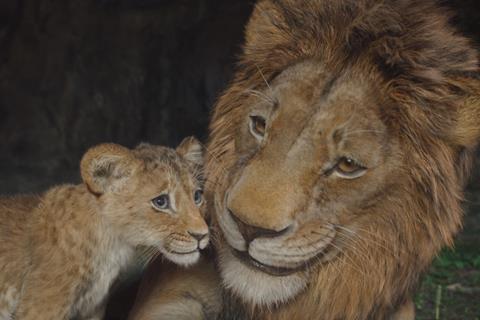Lion King prequel directed by Barry Jenkins looks to exploit a rich franchise

Dir: Barry Jenkins. US. 2024. 118mins
Disney’s 1994 animated blockbuster The Lion King was a classic hero’s journey, following Simba, a young lion who must avenge his fallen father, the wise, noble king Mufasa. The studio’s equally commercially successful “live-action” 2019 remake — which incorporated photorealistic animation to lend a lifelike texture to these wild animals — followed in its predecessors’ narrative pawprints, so it should be little surprise that the new prequel is a comparably mythic tale.
Jenkins’ most mainstream work — and, also, his most impersonal
In Mufasa, director Barry Jenkins explores Mufasa’s adolescence, when he befriends a fellow lion who will eventually become his mortal enemy. The CG images still impress, and there are gripping moments during the film’s second half as the insecure Mufasa embraces his destiny. But like too many origin stories, Mufasa often rehashes what was once stirring about this material.
Opening in the UK and US on December 20, the prequel could be a sizable holiday hit, although it faces stiff competition from Sonic The Hedgehog 3. The 2019 Lion King grossed a whopping $1.7 billion, but that remake was based directly on the popular original. By comparison, although Mufasa boasts original songs from Hamilton mastermind Lin-Manuel Miranda, this new instalment will test audiences’ interest in an extended Lion King cinematic universe. (Perhaps to assuage viewers’ concerns, the filmmakers have made sure to include the perennially wisecracking duo Timon and Pumbaa.)
Lovable mandrill Rafiki (John Kani) explains to Simba’s daughter Kiara (voiced by Blue Ivy Carter) how her late grandfather Mufasa earned his crown. Through extended flashbacks, we watch the young lion (Aaron Pierre) become separated from his parents during a terrible flood, finding his way to a new pride, where he becomes a brother of sorts to Taka (Kelvin Harrison Jr.), the easygoing son of king Obasi (Lennie James).
Mufasa and Taka soon grow close, although they will be threatened by a rival pride, led by the vicious Kiros (Mads Mikkelsen), who wants to rule the African plain.
Jenkins reunites with several longtime collaborators — including editor Joi McMillon and cinematographer James Laxton — but Mufasa lacks the distinctive qualities that marked his acclaimed indies Moonlight and If Beale Street Could Talk. Indeed, the prequel closely copies the photorealistic aesthetic of the 2019 Lion King, directed by Jon Favreau, resulting in Jenkins’ most mainstream work — and, also, his most impersonal.
The film’s early reels are especially wobbly, with Billy Eichner’s Timon and Seth Rogen’s Pumbaa (reprising their roles from the 2019 picture) offering pseudo-hip commentary on Rafiki’s story, which amounts to irritating pop-culture riffing and snarky asides. In addition, while Mufasa’s cutting-edge animation remains striking, the plot struggles to gain dramatic momentum. Most viewers know that Mufasa and Taka’s close bond will sever — and that Taka will become Mufasa’s nemesis Scar, who kills him in The Lion King — but the initial stages of their friendship are not deftly handled, leaving audiences restless.
The Lion King’s award-winning songs, written by Elton John and Tim Rice, set a high bar for Miranda, whose percussive, clever tunes are only sporadically memorable. ’I Always Wanted A Brother’, meant to cement Mufasa and Taka’s connection, has an enjoyable melody, while ’Brother Betrayed’ digs into Taka’s later envy of Mufasa, who woos an alluring lioness, Sarabi (Tiffany Boone), whom Taka also loves. But the songs never rise beyond an agreeable professionalism, while Dave Metzger’s score is occasionally invitingly dark, underlining the life-or-death reality of animals fighting for survival on the savanna.
Predictably, Mufasa repeatedly inserts callbacks to the 1994 and 2019 films. This fan service proves tiresome, but the picture does spring to life once Mufasa and Taka go in search of a mystical eden known as Milele while trying to stay a step ahead of the warlike Kiros. In the process, Mufasa jettisons its jokey tone, ratcheting up the tension to tell a more grownup saga of love, betrayal and violence. And there is no denying the primal power of watching Mufasa and Taka — once the best of friends — start down the fateful path that will turn them into foes.
Consequently, Harrison gives the best performance, his sweet Taka ultimately consumed by jealousy and rage. But what never comes across is a sense that young Mufasa is destined to become the fabled ruler. James Earl Jones portrayed Mufasa in the earlier movies, instantly lending the character a regal grandeur, and the actor’s recent passing is a reminder of just how daunting a task it is to try to depict Mufasa’s early days. Pierre imbues our reluctant hero with sensitivity and a growing courage as he evolves from cub to king, but he does not possess Jones’ booming voice or the late actor’s gravitas. Mufasa tells Mufasa’s origin story, but his essence is much harder to conjure.
Production company: Walt Disney Pictures
Worldwide distribution: Disney
Producers: Adele Romanski & Mark Ceryak
Screenplay: Jeff Nathanson
Cinematography: James Laxton
Production design: Mark Friedberg
Editing: Joi McMillon
Music: Dave Metzger
Main voice cast: Aaron Pierre, Kelvin Harrison Jr., John Kani, Seth Rogen, Billy Eichner, Tiffany Boone, Donald Glover, Mads Mikkelsen, Thandiwe Newton, Lennie James, Anika Noni Rose, Blue Ivy Carter, Beyonce Knowles-Carter






![The Brightest SunScreen[Courtesy HKIFF]](https://d1nslcd7m2225b.cloudfront.net/Pictures/274x183/3/5/0/1448350_thebrightestsunscreencourtesyhkiff_312678.jpg)















![The Brightest SunScreen[Courtesy HKIFF]](https://d1nslcd7m2225b.cloudfront.net/Pictures/100x67/3/5/0/1448350_thebrightestsunscreencourtesyhkiff_312678.jpg)

